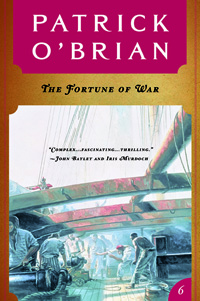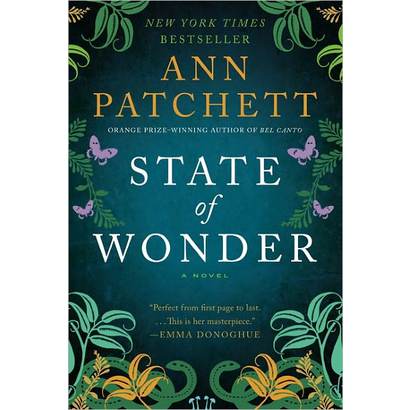
 We read novels to learn how to do something – sight a 16-pound cannon in preparation for a broadside exploding out of the gun deck of a 19th century British Man-of War*; prepare a runway in a field for the desperate takeoff of a small plane**; learn how to recognize agents of the secret police in late 20th century Libya*^; understand the processes by which a new drug emerges from a dangerous, threatened rain forest^^.
We read novels to learn how to do something – sight a 16-pound cannon in preparation for a broadside exploding out of the gun deck of a 19th century British Man-of War*; prepare a runway in a field for the desperate takeoff of a small plane**; learn how to recognize agents of the secret police in late 20th century Libya*^; understand the processes by which a new drug emerges from a dangerous, threatened rain forest^^.
We read novels because their language pleases us, the sound and sense of it so perfectly aligned: “Fog everywhere. Fog up the river, where it flows among green aits and meadows; fog down the river, where it rolls defiled among the tiers of shipping and the waterside pollutions of a great (and dirty) city. Fog on the Essex marshes, fog on the Kentish heights. Fog creeping into the cabooses of collier-brigs; fog lying out on the yards, and hovering in the rigging of great ships; fog drooping on the gunwales of barges and small boats. Fog in the eyes and throats of ancient Greenwich pensioners, wheezing by the firesides of their wards; fog in the stem and bowl of the afternoon pipe of the wrathful skipper, down in his close cabin; fog cruelly pinching the toes and fingers of his shivering little ’prentice boy on deck. Chance people on the bridges peeping over the parapets into a nether sky of fog, with fog all round them, as if they were up in a balloon, and hanging in the misty clouds.”>*
Locked inside ourselves, we read novels because we want to know what others think and feel. We open one, and we are made a party to the slipstream of others’ thoughts and to the secrets that they (and by extension we) keep buried. We dip an eye in and pull up wishes, moments of courage, apprehensions, the working out of schemes, the bundling of countless desires, mysterious images, surges of longing, and fantasies constructed to capture all that we really covet if only we could find the courage to pursue them.
The novel reminds us of how little we know another, how much all of us hide, how we pile secrets upon each other like boxes and bags and old coats in a closet until it all threatens to collapse outward if the door cracks open even an inch. The reader, like an innocent guest trying to be helpful, opens the door, and then, as in a cliché from a comedy, everything spills out onto the bewildered man or woman, secrets bursting apart, secrets draping the startled visitor, secrets as rancid as old table scraps or as fresh and hard as cut apples. But the reader, you and I, live a double life. We open the closet door, our imaginations will not be denied, but we also watch all of it from a safe distance, warm, coffee by our hand, in the light of a table lamp, and we are enthralled by all that we have missed somehow seeing in everyone around us.
Borges# wrote that we can conceive of God by imagining a being who can trace all of the obscure and lost windings of our collective footsteps taken throughout our lives — from our first halting stumbles as a child to the ones that finally lead us to our death beds. Sometimes I hope that the novel might promise something as omniscient.
Part of what I have been looking for is that kind of a Borgesian moment when a passage from a novel I am currently reading suddenly stands forth as if illuminated from within. It falls into one of the empty spaces in the mosaic of poems and plays and novels that I have been reading for 40+ years. That passage becomes the key to understanding how to see into others, how to go beyond the surfaces. It becomes a kind of x-ray capacity for the soul.
Even as I write this I am made aware of how grotesque a desire this is, of how destructive its realization would be. This is hubris. I do not really want to see behind the masks. Only God should look into souls. Only God could bear the weight of the revelations that would be ever-present. No, I just want to be less blind than I have been, more aware of the nuances that flash in each person’s speech and actions like light caught in leaves.
The double-ness that novels expose in us shows itself in a yearning at the opposite end of the spectrum of a complete intuitive insight. Novels have also demonstrated to me that each one of us wants to be looked at, really looked at, and asked about his and her life. No one wants to be rendered invisible. No one wants to be unthought of. The whole world wants to be recognized as more than sacks of water, blood and bone. The novel shows us again and again that we want an interested, gentle gaze to fall upon us. Almost always too polite to ask, too shy to make the request, nevertheless, we want someone, many someone’s, to look inside and say, “Ah yes, I can see you. I can. Tell me a story. Tell me about your day.”
* Any of the 21 Aubrey/Maturin novels about the Napoleonic Wars by Patrick O’Brian
http://www.npr.org/2013/12/01/246427056/a-skeptic-is-swept-away-by-the-bromance-at-sea-in-master
** The Dog Stars by Peter Heller
http://www.npr.org/2012/08/07/157431750/dog-stars-dwells-on-the-upside-of-apocalypse
*^ In the Country of Men by Hisham Matar
http://www.nytimes.com/2007/03/04/books/review/Adams.t.html?_r=0
^^ State of Wonder by Ann Patchett
>* The second paragraph of Bleak House by Charles Dickens; http://www.literaturepage.com/read/dickens-bleak-house-3.html
>> Jorge Louis Borges, 20th century Argentinian writer of fictions; http://www.themodernword.com/borges/borges_works.html
Lovely.